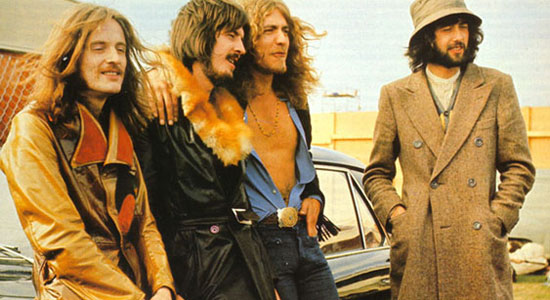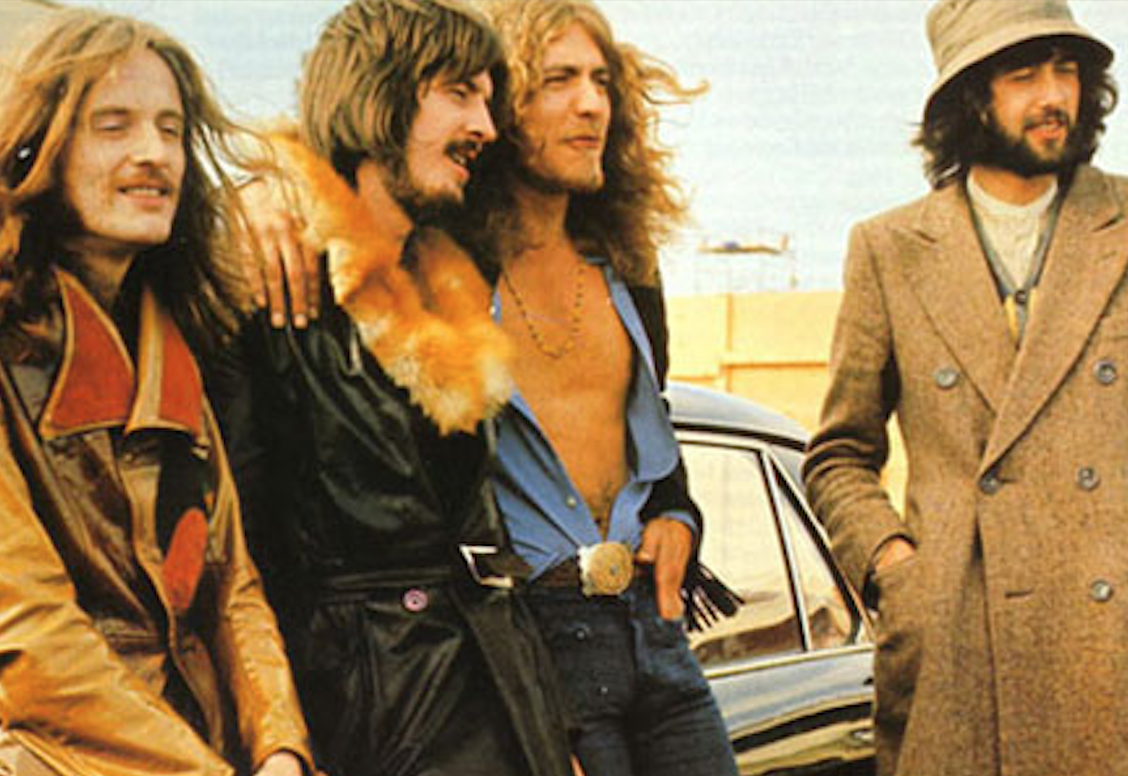Each week, we take a look at some obscure or overlooked entries in the catalogs of music’s big names. MAGNET’s Bryan Bierman focuses on an album that, for whatever reason, slipped through the cracks in favor of its more popular siblings. Whether it’s new to you or just needs a revisit, we’ll highlight the Hidden Gems that reveal the bigger picture of our favorite artists.

By the mid-to-late ‘70s, punk music had left the underground dungeons of New York and London—the unofficial headquarters—to blanket the rest of the world with its abrasion. Even more afraid of the oncoming wave than parents were the aging “dinosaur” bands. Rock royalty was forced to stand by the sidelines as “snotty boys with lipstick on” (to quote Frank Zappa) made the overwrought mysticality and 12-minute solos that many of them practiced seem unnecessary. Entire punk records were made using no more than six chords, revealing that anyone could do it, everyone was doing it, and that you didn’t need to sell out arenas to change the world. In the Clash’s “1977,” there was “no Elvis, Beatles or the Rolling Stones.” In the real 1977, this was pretty much true—Elvis was dead, as were the Beatles, and the Stones were swiftly losing their relevance. However, some of these superstars, the same ones who paved the way for the new breed, soon came out swinging: The Rolling Stones released Some Girls in ’78, blending the era’s new sounds into one of their biggest hits, while the Who looked the punks in the eye and asked, “Who the fuck are you?” But Led Zeppelin remained silent.
While the new kids went off to kill their (appropriated) musical fathers like some Oedipal fever dream, Robert Plant was still mourning the death of his son. Karac Plant, just five years of age, had passed away in July ’77 of a stomach infection while Zeppelin was on tour in the States. Understandably, the rest of the tour was cancelled, and the group immediately went on hiatus. During this time, with the band continuing to live outside the U.K. as tax exiles, a traumatized Plant pondered his future, Jimmy Page’s heroin addiction grew increasingly worse, and the public wondered if Zep was on its last legs.
By the end of ’78, Zeppelin was finishing the recording of its eighth studio record, In Through The Out Door, though things had been noticeably different. Page’s drug problem prevented him from taking the reins as he previously had done, while John Bonham spent a lot of his time out drinking. The album’s unsung hero became John Paul Jones, who guided the band along during the sessions (even though Page received full production credit). Jones also greatly influenced the sound of In Through The Out Door, featuring more of his keyboards and synths than ever. The woozy new sounds backed a bulk of the album’s songs, many of which had a lighter feel than usual, including “All My Love,” Plant’s tribute to his late son. If you compare it to the band’s earlier works, the album was bloated and lacked energy, but that’s an unfair thing to do. Although Zeppelin’s best days were behind them, the record still has some pretty amazing moments. Reviewing a live 1979 version of “In The Evening” for Grantland, famed critic Chuck Klosterman summed it up best: “This is Led Zeppelin when they sucked. And wouldn’t it be wonderful if all things were this bad?”
In Through The Out Door was a big hit, despite the fact that it was everything the punks were against. Zeppelin seemed to agree with some of the recent criticisms of the band, as its three-week tour of Europe in the summer of 1980 addressed them. They chucked the stage theatrics in favor of playing smaller venues, left out the lengthy songs and solos, dressed different and even cut their hair. In Mick Wall’s When Giants Walked The Earth: A Biography Of Led Zeppelin, Plant explains, “By the late ’70s, everything had become so overindulged, not just with the drugs, which it was, but the music itself. It had gone from this tremendously exciting burst of energy at the end of the ’60s, to this overindulgent monster looking for a place to die.” Unfortunately, a death from overindulgence is what would kill the beast.
On Sept. 25, 1980, Bonham—arguably the rock greatest drummer to ever live—died at the age of 32. Over the course of the previous day, amidst band rehearsals at Page’s Windsor home, Bonham consumed a very large, though for him, not unusual amount of liquor. (An autopsy stated it was equivalent to about 40 shots of vodka.) While asleep, Bonham suffered swelling of his blood vessels (pulmonary oedema) and choked on his vomit. It was devastatingly clear to the three surviving members that Led Zeppelin was finished, and in December of that year, they announced just that. As it turned out, Zeppelin wasn’t taken down by the onslaught of punk, but rather, their own excess.
Although the three members grieved the death of their friend, even after the band’s dissolution, there was work to be done. Led Zeppelin was still contractually obligated to deliver one more album to Atlantic Records, not to mention the taxes on its old recordings that were still owed. In order to solve these two problems (plus combat bootleggers), the group decided to release a compilation of unreleased outtakes. In the summer of ’81, Page began putting together what would be their final studio “album,” Coda.
Co-written and recorded by Ben E. King in 1963 (as “Groovin’”), “We’re Gonna Groove” kicks off the album with the heavy, funky blues that early Zeppelin did so well. This track was originally slated for inclusion on Led Zeppelin II, but luckily it sees the light of day here. Not only did the band open up many of its 1970 concerts with this song, but this is an overdubbed version of one. (Well, maybe. Coda’s liner notes say that this is actually a studio recording from ’69, but it appears to be taken from a live show in January 1970 at the Royal Albert Hall, available on the Led Zeppelin DVD. Nevertheless … ) As usual, Bonham’s drums drive the song, attacking the ride like a hip-hop break beat. Page overdubbed several distorted guitar tracks on top of this in ’82, which makes it significantly more evil than it would have, and it’s damn hard not to enjoy early-Plant’s chest-puffed, I’m-gonna-fuck-all-your-girlfriends scream.
Bonham is known for being one of the loudest, most powerful drummers of all time, and rightly so. (See his solo, “Bonzo’s Montreux,” on this album.) The sound he achieved was giant—not just the result of tuning and mic placement, but by being completely engulfed in the performance. (If you listen to isolated drum tracks found on bootlegs, you can literally hear him grunting as he plays.) But like all great drummers, he knew when to hold back, appreciating that he was there to serve the song. At this, Bonham was a master, and there’s no better example in the band’s catalog than “Poor Tom.” Recorded in 1970 for Led Zeppelin III but not used, “Poor Tom” tells the story of the eponymous railroad worker whose clairvoyance (as a “seventh son”) leads to the knowledge of his wife’s affairs. It’s extremely rare for the highlight in an acoustic song to be the drums, but Bonzo’s never-ending snare/bass/hi-hat shuffle adds a unique element that never overpowers. Like many other Zep tunes, this one has its roots as an old blues tale. Recorded in 1929, Reverend Robert Wilkins’ “That’s No Way To Get Along” is musically quite similar to “Poor Tom,” and was even covered by the Rolling Stones a few years earlier as “Prodigal Son.” The track ends with a harmonica solo from Plant, an instrument his skills deserve more credit for.
Although many agree that Out Door was a tad underwhelming, Page has consistently remarked that it would have been a transitional album for the band. In a 2005 interview with Uncut, Page described the sound that he and Bonham were planning on going for next: “I’d already discussed the next album with him, and we said we were going to resort to some really intense riffing. I don’t want necessarily to call it heavy, but you know what I mean by that. That’s the way I figured the next album should be, because the music had started to lighten up on In Through The Out Door, and I wanted to get back to that sort of urgent intensity that we managed to evoke.” With Bonham’s death, we’ll never get to hear what this would have sounded like, but Coda gives a few hints, in the form of several 1978 outtakes.
“Ozone Baby” is possibly the sound that fans disappointed with Out Door would have loved to hear instead of the synth results they received. The classic bass/guitar/drums lineup heard here is familiar but sharp, and Plant’s vocals are in fine form. Jones’ springy and metallic bass holds the song together, though it skirts around occasionally to add flair. This seems to be an example of their planned short, solo-less direction, as does “Wearing And Tearing,” one of the best songs in the band’s entire history. Featuring Bonzo’s monstrous drums (which are mixed even higher than usual), “Wearing And Tearing” is no doubt Zeppelin’s take on the punkers who aimed to take them down. These two songs (as well as Elvis knockoff “Darlene”) were originally planned to be released as a tour-only EP that never materialized. It most likely would have appeared on the band’s next album. There was, however, another plan for “Wearing And Tearing,” which Plant later explained to journalist Steve Rosen, in a 1983 interview: “We wanted to put it out as a single on a different label, putting it down by a different artist just to stick it out alongside the Damned and the Sex Pistols. It was so emphatically fresh; if you hadn’t known it was us it could have been anybody at all who was young and virile, two things that we were perceived to be the antithesis of, at that time.”
As an album, Coda wasn’t game-changing, nor is it likely anyone’s favorite Led Zeppelin record. It was stuff from the cutting-room floor, even if Zeppelin’s throwaways are better than most groups at their best. It’s an album that would later be labeled “for hardcore fans only,” even though the world is full of them. If Coda accomplishes anything, it’s that it gives a sendoff to a band that ended tragically—a band that still had things to say.






